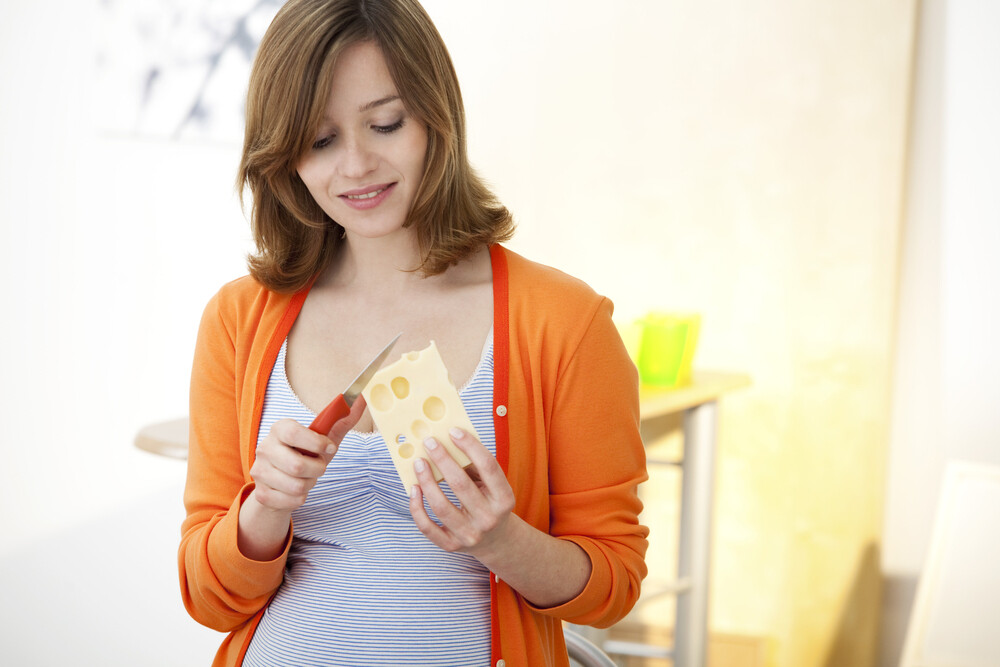Cheese in pregnancy? Find out here which cheese you can eat without hesitation and which varieties you should avoid.
You are a real gourmet, you love cheese more than anything else, but you don’t know which cheese you can eat during pregnancy? You don’t have to give up cheese completely in any trimester of your pregnancy. After all, cheese provides your body with calcium, trace elements, minerals and protein. But which cheese is allowed and which one should you avoid when you are pregnant? Here are the answers.
Cheese during pregnancy: The advantages
Especially during pregnancy you should pay attention to a varied and healthy diet. Dairy products like cheese provide you and your baby with many nutrients that are good for both of you.
- Calcium strengthens your bones and those of your baby.
- B vitamins help to build the nervous system and to produce red blood cells.
- You can satisfy your increased protein requirements during pregnancy with cheese.
- Cheese is rich in minerals such as potassium, magnesium and phosphorus and contains important trace elements such as copper, zinc and iron.
Cheese in pregnancy: The background
But why can some cheeses be consumed during pregnancy and others not? The basic rule is: Do not eat raw food from animals. Of course this includes raw milk products. And of all things, raw milk is used to make many types of cheese. This makes delicious cheese, but because the milk is not heated, many germs can survive.
Special care is required with listeria. The bacteria can cause listeriosis, which is usually harmless but very dangerous for pregnant women and their unborn children. If the infection spreads to the fetus in the first trimester, the risk of miscarriage increases. If mother and child develop listeriosis at a later stage of SSW, there is a risk of malformation, serious illness or even miscarriage.
However, not only raw milk plays a role, but also the moisture and acid content is crucial. Blue and white mould soft cheeses, for example, are less acidic and moister than other varieties, making them a perfect breeding ground for bacteria.
You can eat these cheeses
- Soft, semi-hard and pasteurised milk cheeses without rind: Gouda, butter cheese, Leerdammer, Tilsiter, Edam, Cheddar, Brie, Camembert
- Hard cheese (possibly also from raw milk), without rind: Parmesan, Emmental, mountain cheese
cooked cheese, processed cheese - Baked camembert, oven cheese, cheese fondue, raclette
- Industrially produced and packaged fresh or pickled cheese: feta, cottage cheese, mascarpone, ricotta and other fresh cheeses, mozzarella
These cheeses are taboo
- Soft and semi-hard cheeses made from raw milk: Camembert, Brie, Roquefort
- Soft cheese with red smear: Limburger, Münster, Romadur
- Acid curd cheese: Harzer Rolle, hand cheese, Mainz cheese, Olmützer Quargel, pointed cheese, basket cheese
grated cheese - Blue cheese: Bavarian blue cheese, Bergader, Bleu d’Auvergne, Danablu, Gorgonzola, Romano, Roncal, Roquefort, Stilton, Tomme
- Pickled cheese or fresh cheese from open containers: feta, sheep’s cheese, mozzarella
Cooking with cheese?
And what about cheese that has been heated in the home kitchen? From a temperature of 70 degrees, the all-clear can be given – listeria is killed, even in raw milk cheese. A sauce with gorgonzola, camembert from the oven, grated cheese on a pizza or casserole are therefore no problem during pregnancy, as long as the milk products have been given sufficient heat. So you can enjoy delicious cheese in every weeks of pregnancy.
What you should pay attention to
- Listeria can settle on the cheese rind, even in cheese made from pasteurised milk. It is therefore better to cut off the outside of each cheese.
- Listeria bacteria and other pathogens can be persistent. They even multiply quickly in the refrigerator. Buy small quantities of the popular milk product and consume it quickly.
- Look for the labels “made from raw milk”, “unpasteurised” or “made from non-pasteurised milk”. If you find any of these indications on the label, do not buy these raw milk products, regardless of which weeks of pregnancy you are in.

